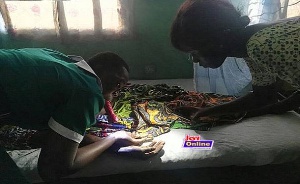 Ojuolape said increased access to well-trained midwives could help prevent women from dying
Ojuolape said increased access to well-trained midwives could help prevent women from dying
The United Nations Population Fund (UNFPA) has highlighted the urgent need for more qualified midwives to save mothers from pregnancy and childbirth-related deaths.
Mr. Niyi Ojuolape, its Country Representative, said increased access to well-trained midwives could help prevent women and their babies from dying from avoidable causes.
About 319 women out of every 100,000 live births in the country die during pregnancy and childbirth, with 25 babies out of every 1,000 live births not surviving the first month of life.
Speaking at the national launch of the “27th international day of the midwife” in Kumasi, Mr. Ojuolape said they were the critical workforce needed to change the worrying situation.
“Midwives leading the way with quality care” was the theme chosen for the event and brought together hundreds of them from across all the 10 regions.
The ceremony was used to recognize 14 of the midwives for outstanding performance.
The UNFPA Country Representative said although millions of women globally increasingly were able to exercise their sexual and reproductive right, many of them still lacked access to sexual and reproductive health services.
He made reference to the theme for the celebration and said it underscored the critical part they had been playing in the health sector, adding that they were the backbone of healthy families and communities.
It was worth celebrating them “for the heroic and life-saving work” they were doing every day, often under difficult conditions.
The UNFPA since 2008 has been working with partners to support training of midwives, strengthen national midwifery associations and to help enhance the regulatory framework for midwifery practice to ensure accountability.
Mrs. Netta Forson Ackon, President of the Ghana Registered Midwives Association, said they were had been central to efforts at improving the quality of mother and child care.
She pointed out that they had been working in poorly resourced health facilities and under “very poor conditions” at all levels of the healthcare delivery.
“More often these midwives have to function independently or as the sole midwife for a whole community in order to offer the needed respectful maternity care to bring hope, love and good health to mothers and their babies.”
With little or zero support, they “are on hand 24 hours and without any security”, she added.